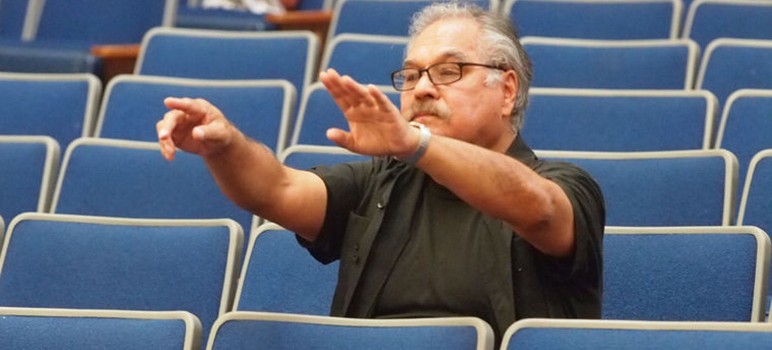Luis Valdez, the playwright, theater director, actor and lifelong activist, joined arts luminaries Thursday morning at the White House to receive the 2015 National Medal of Arts.
Valdez was honored “for bringing Chicano culture to American drama,” the White House spokesperson announced as the San Juan Bautista resident took the stage. “As a playwright, actor, writer and director, he illuminates the human spirit in the face of social injustice through award-winning stage, film, and television productions."
The packed ceremony was jovial and visibly joyous—with laughter as President Barack Obama greeted each of the award medalists in a mid-morning ceremony notable for its inclusivity of genre.
“I can tell,” the president began, with a sly smile, “this is a rowdy crowd.”
Recognized alongside Valdez were Broadway star Audra McDonald; comedian and filmmaker Mel Brooks; dancer Ralph Lemon; author Sandra Cisneros; composer Philip Glass; musicians Berry Gordy and Santiago Jiménez, Jr.; painter Jack Whitten; playwright and director Moisés Kaufman; and the Eugene O'Neill Theater Center.
The National Humanities medals were presented at the same ceremony, with a similarly wide-ranging list of artistic giants.
The National Medal of Arts are awarded annually to artists deemed “deserving of special recognition by reason of their outstanding contributions to the excellence, growth, support and availability of the arts in the United States." It is the highest award granted to artists by the government, and the president—as Obama did this year—may choose up to a dozen awardees.
In a statement before the awards, Valdez referenced San Juan Bautista-based El Teatro Campesino playhouse.
“I am honored to receive this recognition from President Obama and the National Council of the Arts. I share it with the countless artists who have created El Teatro Campesino over the last fifty years,” it read.
Past recipients have included poet Maya Angelou and dancer Mikhail Baryshnikov (both in 2000), choreographer Martha Graham and the artist Georgia O’Keefe—both in 1985, the inaugural year of the awards.
Born to migrant workers and raised in a community of Mexican farm workers—he met civil rights leader Cesar Chavez when he was just six years old—Luis Valdez became an activist for migrant workers’ rights as a young man. In 1965 he founded El Teatro Campesino (the Farmworkers Theater) as a direct outgrowth and a creative response to the efforts of the United Farm Workers. Indeed, according to Nancy Richman of Earlham College, the first “actos,” or short plays, were “initially performed in flatbed pickup trucks on picket lines” of the famous Delano Grape Strike. Valdez is often referred to as the “godfather of Chicano theater.”
Valdez also was the force behind the Golden Globe-nominated film “La Bamba” (1987), which chronicled the life of Richie Valens. His many plays and other work have been recognized by the Obie awards, the Presidential Medal of the Arts, the Hispanic Heritage Awards in Literature and the Emmy awards.
The now-75 year old has never stopped producing theater. The Los Angeles Times called his 2013 play “Valley of the Heart,” which completed a sold-out run at San Jose Stage Company earlier this year, a “quintessentially California play, written by a master of the genre.”
In his remarks before the medals were awarded, Obama spoke to the legacy of the diverse artists, Valdez included.
“Michelle and I have tried to make it a priority to promote the arts and the humanities, especially for our young people, and it’s because we believe that the arts and the humanities are, in many ways, reflective of our national soul,” the president said. “They’re central to who we are as Americans—dreamers and storytellers, and innovators and visionaries. They’re what helps us make sense of the past, the good and the bad. They’re how we chart a course for the future while leaving something of ourselves for the next generation to learn from.”
He continued, “the arts and the humanities …. lift up our identities, and make us see ourselves in each other. And today’s honorees each possess a gift for this kind of creative empathy—a gift that allows us to exchange a sense of what’s most important and most profound in us, and to identify with our collective experience as Americans.”
Valdez has spent the last half century bringing the Chicano experience and culture to the stage and screen.
“Now people call me a legend,” Valdez told the Mercury News last year, upon the 50th anniversary of El Teatro Campesino. “I don’t know about that. I know that I came first and I did what had to be done. If that makes me a legendary figure, so be it.”

